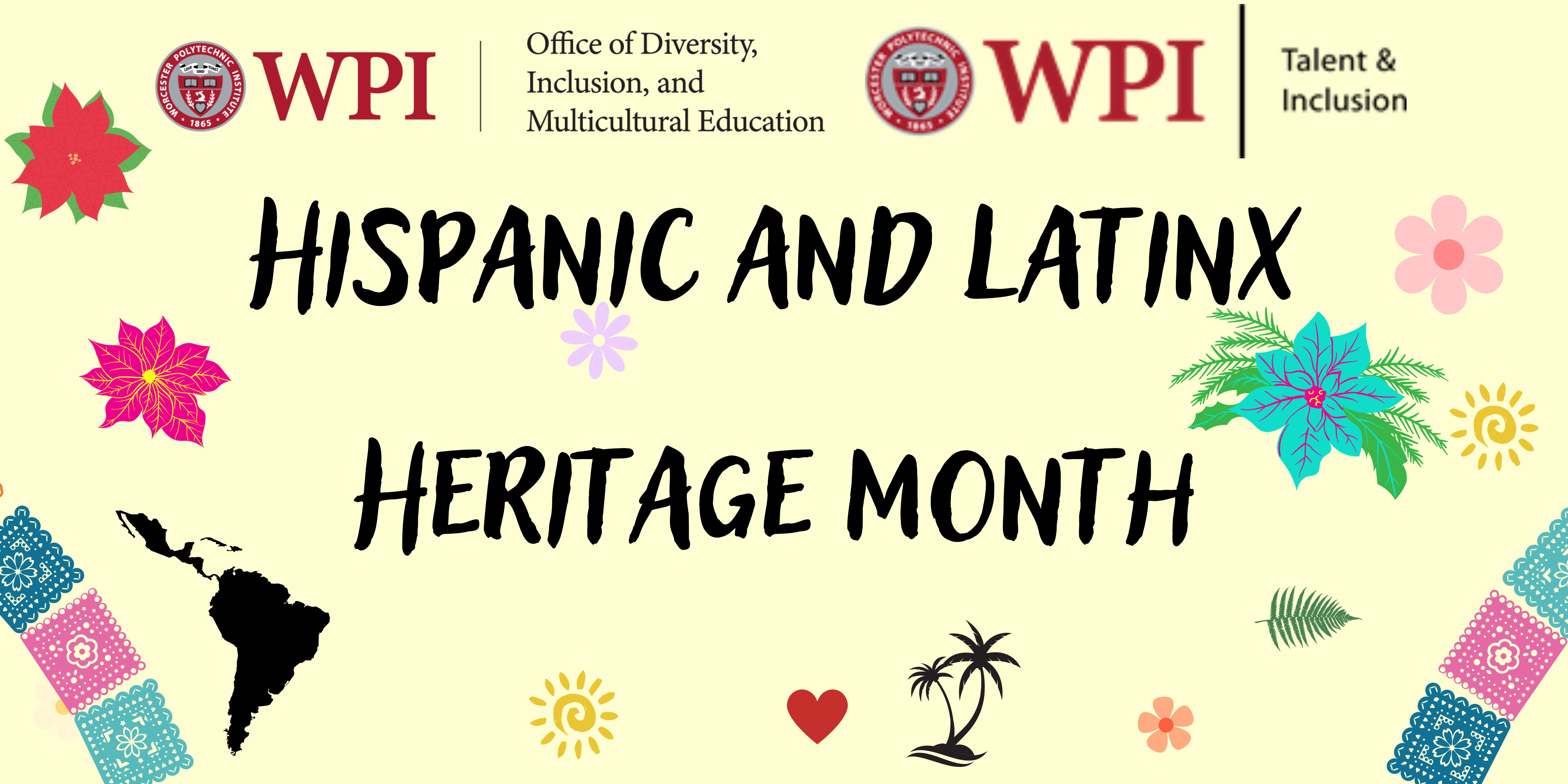WPI Celebrates Hispanic and Latinx Heritage Month 2023

Worcester Polytechnic Institute (WPI) celebrates Hispanic and Latinx Heritage Month 2023 by honoring and highlighting the diverse culture, heritage, and contributions of Hispanic and Latinx communities throughout history. We encourage our community to study, observe, and celebrate these communities and their rich heritage.
Hispanic and Latinx Heritage Month is when the United States of America celebrates the culture and contributions of its citizens with roots in Latin America and Spain. During the celebration, there are many traditions, pieces of music, arts, foods, and literature displayed by both communities. We also take this time to recognize the achievements and contributions of both communities’ many activists, leaders, scientists, athletes, artists, and more.
Although today the celebration is a month-long, that was not always the case. In June of 1968, George E. Brown, a California congressman introduced what would later become Hispanic and Latinx Heritage Month as a week-long commemoration. During the civil rights movement, the demand for recognition of Hispanic and Latinx contributions grew, especially in the 60’s. On September 17, 1968, Congress passed Public Law 90-48, which authorized and requested President Lyndon Johnson to issue the first of many presidential proclamations for Hispanic and Latinx Heritage Week. In 1987, U.S. Rep. Esteban E. Torres of California would later propose the expansion from a heritage week to a heritage month. Then in 1989, President George H.W. Bush declared the period between September 15th to October 15th as the National Hispanic and Latinx Heritage Month.
STEM Scholar Highlights:
- Luis Alvarez (Physicist)
- France Córdova (Astrophysicist)
- Ellen Ochoa (Astronaut & Engineer)
- Mario J. Molina (Chemist)
Explore, Read, Watch, Listen
- Explore the Gordon Library’s Hispanic and Latinx Heritage Month collection
- Explore National Hispanic Heritage Month online
- Listen to the Latinos Out Loud Podcast
- Watch “La Misma Luna” (2007, Mexican American Drama)
- Listen to Yo Más Te Adoro by Morat
- Explore PBS Hispanic Heritage Month Documentary collection
- Explore the New Smithsonian Institution’s National Museum of the American Latino
- Read National Hispanic Heritage Month: Sept. 15-Oct. 15, 2022 by the United States Census Bureau
- Read Biden to attend premier Hispanic Heritage Month Event online written by Rafael Bernal, The Hill
- Read Gordon Library’s Our Voices, Our Images: A Celebration of Hispanic Heritage Month
- Read DC Comics features stereotypical Latino foods on Hispanic Heritage Month covers online written by Harmeet Kaur, CNN
- Read “National Hispanic Heritage Month Q&A” written by Insight Staff, Insight Into Diversity
- Read The U.S. Hispanic Manifesto by The Hispanic Star
- Read and explore the National Archives Hispanic Heritage Month News website
- Explore Celebrating Hispanic Heritage Month through WGBH and WORLD Channel
- Watch Hispanic Heritage Month Movies
- Watch The Latino List: Volume 1 and 2 online via Gordon Library
- Directed by Timothy Greenfield-Sanders
- Watch Retablo online via TubiTV
- Directed by Alvaro Delgado-Aparicio, written by Alvaro Delgado-Aparicio and Hector Galvez, produced by Enid Campos, Alvaro Delgado-Aparicio, Lasse Scharpen, and Menno Döring, (Lima, Peru: Siri Producciones, Catch of the Day Films, DHF, 2017), 95 minutes
- Listen to the Level Up Latina Podcast
- Listen to the Latinx On The Rise Podcast
- Listen to the Alt Latino Podcast
Take Action
- Support the Congressional Hispanic Caucus Institute
- Support the TransLatin@ Coalition
- Donate at the LATINO SCHOLARSHIP FUND OF WESTERN MASSACHUSETTS (latinoscholarshipwesternmass.org)
- Support the Latinx in Media and Arts Coalition
- Register to Vote -OR- Check Your Voter Registration
- Everything you need to vote. Vote.org
- Become a Poll Worker
“The timing of Hispanic Heritage Month coincides with the Independence Day celebrations of several Latin American nations. September 15 was chosen as the kickoff because it coincides with the Independence Day celebrations of five “Central American neighbors,” as Johnson called them—Costa Rica, El Salvador, Guatemala, Honduras, and Nicaragua. Those five nations declared their independence from Spain on September 15, 1821.”